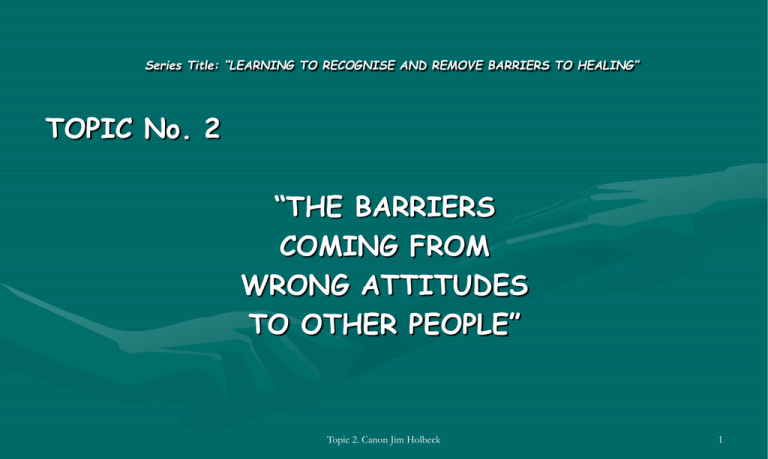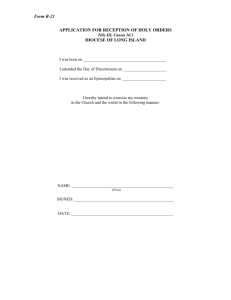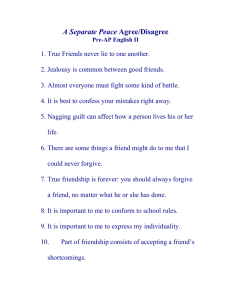Melb-Barriers to Healing-No2
advertisement

Series Title: “LEARNING TO RECOGNISE AND REMOVE BARRIERS TO HEALING” TOPIC No. 2 “THE BARRIERS COMING FROM WRONG ATTITUDES TO OTHER PEOPLE” Topic 2. Canon Jim Holbeck 1 The Barriers The barriers are like bricks preventing God’s grace and healing being received by those who maintain those attitudes 1. Expressing no love or compassion to others. An inability or unwillingness to love others. 2. Harbouring Bitterness and Resentment against others Topic 2. Canon Jim Holbeck 3. Unforgiveness. An unwillingness to forgive others 2 1). NO LOVE AND COMPASSION AN INABILITY OR UNWILLINGNESS TO LOVE OTHERS Topic 2. Canon Jim Holbeck 3 God’s purpose for the human race It was expressed in both the Old and New Testaments. To love God. To love our neighbour It was summed up by Jesus in the form of the two Great Commandments. Mk 12:29 Jesus answered, "The most important is, 'Hear, O Israel: The Lord our God, the Lord is one. 30 And you shall love the Lord your God with all your heart and with all your soul and with all your mind and with all your strength.' 31 The second is this: 'You shall love your neighbour as yourself.' There is no other commandment greater than these." Topic 2. Canon Jim Holbeck 4 Love for others was commanded in both Old and New Testaments Commanded through Moses (Lev 19:18) You shall not take vengeance or bear a grudge against the sons of your own people, but you shall love your neighbour as yourself: I am the LORD. Commanded through Jesus As above in Mk 12:29-31 and also in the Sermon on the Mount in Mat 5:43-44 where Jesus affirmed the Old Testament teaching and added to it in terms of even loving enemies. "You have heard that it was said, 'You shall love your neighbour and hate your enemy.' 44 But I say to you, Love your enemies and pray for those who persecute you Topic 2. Canon Jim Holbeck 5 Love for others was commanded in both Old and New Testaments (continued) Paul expressed it. He saw that if people really loved one another then they would not sin against each other. They would not break the commandments in the Decalogue if they were loving their neighbours. (Rom 13:9) The commandments, "You shall not commit adultery, You shall not murder, You shall not steal, You shall not covet," and any other commandment, are summed up in this word: "You shall love your neighbour as yourself." Topic 2. Canon Jim Holbeck 6 Love for others was commanded in both Old and New Testaments (continued) Paul saw the law being fulfilled through love. The whole law could be summed up in the one command to love one’s neighbour. Gal 5:14 For the whole law is fulfilled in one word: "You shall love your neighbour as yourself.“ James commented on the importance of love to one’s neighbour. Jas 2:8, If you really fulfill the royal law according to the Scripture, "You shall love your neighbour as yourself," you are doing well. Topic 2. Canon Jim Holbeck 7 Love for others was commanded in both Old and New Testaments (continued) Love for one’s neighbour doesn’t come naturally. Many people are unable to love as they should. Our ability to love is a sign that we have become spiritually alive or born again. John put it, 1Jn 3:14 We know that we have passed out of death into life, because we love the brothers. Whoever does not love abides in death. Such love for one another is a sign of His presence within us by His Spirit. 1Jn 4:12 No one has ever seen God; if we love one another, God abides in us and his love is perfected in us. Topic 2. Canon Jim Holbeck 8 Love for others was commanded in both Old and New Testaments (continued) God can motivate us by His Spirit to do that which we were not capable of doing before. How? John’s answer. 1Jn 4:19 We love because he first loved us. Responding to His love for us releases love within us for Him but AND for our fellow humans. Paul’s answer. Rom 5:5. True love comes from God Himself and is imparted to His people by His Spirit, God's love has been poured into our hearts through the Holy Spirit who has been given to us. Peter observed. 1 Pet 1:22. Genuine love for others comes from those who live in obedience to the truth. Now that you have purified your souls by your obedience to the truth so that you have genuine mutual love, love one another deeply from the heart. Topic 2. Canon Jim Holbeck 9 AN OBSERVATION ON MINISTRY One of the great delights in Christian ministry. Seeing people who once were unloving being transformed into sensitive, thoughtful, loving and caring people. That should be happening as people are transformed more and more by the Spirit of God into the likeness of Christ. 2Cor 3:18 And we all, with unveiled face, beholding the glory of the Lord, are being transformed into the same image from one degree of glory to another. For this comes from the Lord who is the Spirit. Topic 2. Canon Jim Holbeck 10 AN OBSERVATION ON MINISTRY (continued) One of the sadnesses of ministry Seeing people choose not to love other people as God commanded them to do. Refusing to love, places them outside God’s will as John wrote, Jn 13:34 I give you a new commandment, that you love one another. Just as I have loved you, you also should love one another. They are accountable to God for their unwillingness to love. They have failed to appropriate the grace of God which would enable them to love. Their attitude is a barrier to their healing and blessing. Topic 2. Canon Jim Holbeck 11 2). HARBOURING BITTERNESS OR RESENTMENT Topic 2. Canon Jim Holbeck 12 2). HARBOURING BITTERNESS OR RESENTMENT (continued) Why do people become bitter and resentful? Many different reasons. The dangers of bitterness and resentment. (If we allow them to take root and “simmer” within us without dealing with them). The Greek word for “bitterness” is pikria. From that word comes “picric” acid which is noted for its extremely bitter taste, its instability and its explosive force. One might say that bitterness is like a vile acid eating away within us or an instability within us waiting to explode. Topic 2. Canon Jim Holbeck 13 2). HARBOURING BITTERNESS OR RESENTMENT (continued) The Palmist in Ps 73 spoke of his bitterness and the effect it had on him, 21 When my soul was embittered, when I was pricked in heart, 22 I was stupid and ignorant; I was like a brute beast toward you. He lost control and began to act like an animal rather than as a rational human being. Bitterness can twist or distort the mind (as well as the intestines.) Topic 2. Canon Jim Holbeck 14 Bitterness. Pikria. (Noun) Examples of bitterness in the Bible Arising from jealousy or covetousness. In Acts 8 we read of Simon who before his conversion was heavily involved in magic and called himself “somebody great”. Peter and John came down to Samaria and laid hands on the new converts. We read, Act 8:18 Now when Simon saw that the Spirit was given through the laying on of the apostles' hands, he offered them money, 19 saying, "Give me this power also, so that anyone on whom I lay my hands may receive the Holy Spirit." Topic 2. Canon Jim Holbeck 15 Bitterness. Pikria. (Noun) (continued) Peter recognised that Simon was jealous of the apostles and covetous. Acts 8:20 But Peter said to him, "May your silver perish with you, because you thought you could obtain the gift of God with money! 21 … your heart is not right before God. 22 Repent, therefore, of this wickedness of yours, and pray to the Lord that, if possible, the intent of your heart may be forgiven you. 23 For I see that you are in the gall of bitterness and in the bond of iniquity." 24 And Simon answered, "Pray for me to the Lord, that nothing of what you have said may come upon me.“ Jealousy and being covetous of what another person has, leads to bitterness of soul. Topic 2. Canon Jim Holbeck 16 Bitterness. Pikria. (Noun) (continued) Arising from our speech. There may be bitterness in the way we speak to or about other people. Paul warned in Eph 4:29 Let no corrupting talk come out of your mouths, but only such as is good for building up, as fits the occasion, that it may give grace to those who hear. 30 And do not grieve the Holy Spirit of God, by whom you were sealed for the day of redemption. How could they grieve the Spirit? By uttering hurtful or damaging words. Eph 4:31 Let all bitterness and wrath and anger and clamor and slander be put away from you, along with all malice. 32 Be kind to one another, tenderhearted, forgiving one another, as God in Christ forgave you. Topic 2. Canon Jim Holbeck 17 Bitterness. Pikria. (Noun) (continued) Arising from being discontented and critical of others. Instead of striving for peace and being holy oneself we verbalise our bitterness and affect others as a result. Heb 12:14 Strive for peace with everyone, and for the holiness without which no one will see the Lord. 15 See to it that no one fails to obtain the grace of God; that no "root of bitterness" springs up and causes trouble, and by it many become defiled Topic 2. Canon Jim Holbeck 18 Bitterness. Pikria. (Noun) (continued) Arising within a marriage. Paul challenged Christian husbands in a time when the rights of women were not respected, Col 3:19. Husbands, love your wives, and do not be harsh (bitter) with them. Pikrainō, (Verb form of pikria). From being jealous of other people. Or from having selfish ambitions. Jas 3:14 But if you have bitter jealousy and selfish ambition in your hearts, do not boast and be false to the truth. (Bitter=Pikros is an adjective). 15 This is not the wisdom that comes down from above, but is earthly, unspiritual, demonic. 16 For where jealousy and selfish ambition exist, there will be disorder and every vile practice. Topic 2. Canon Jim Holbeck 19 Bitterness. Pikria. (Noun) (continued) BITTERNESS is a MASSIVE BARRIER to receiving God’s blessing and healing. How do you get rid of it? Ignore it? Excuse it? Deny it? Try to taper it down? None of these work. St Paul has a good answer for bitterness. His advice in Eph 4:31 (NIV) is Get rid of all bitterness, rage and anger, brawling and slander, along with every form of malice. Topic 2. Canon Jim Holbeck 20 Resentment There are few references in the Bible to “resentment” as such but it can describe someone who has been ignored or rejected and who keeps on thinking about how badly they were treated. It is an inner “smouldering.” King Ahab was resentful when Naboth refused to give or sell his vineyard to him, 1 Kings 21:4, Ahab went home resentful and sullen because of what Naboth the Jezreelite had said to him; for he had said, "I will not give you my ancestral inheritance." He lay down on his bed, turned away his face, and would not eat. His wife Jezebel responded to his resentment by having Naboth falsely accused and put to death to enable Ahab to claim the vineyard. Topic 2. Canon Jim Holbeck 21 Resentment (continued) In 1 Cor 13:5 Paul describes love in this way, It does not insist on its own way; it is not irritable or resentful (ESV). The word for “resentful” literally means, “thinking about the evil”. Love then means not focussing on the evil which had been directed towards oneself but letting it go. Resentment is closely allied to unforgiveness. It can go from a person when they get round to forgiving the person with whom they are angry. Topic 2. Canon Jim Holbeck 22 Resentment (continued) If we are RESENTFUL AGAINST GOD then that must cease. God will never ask us to forgive Him, for He as the judge of all the earth never does anything wrong. Instead we need to ask God to forgive us for holding resentment against Him. If we are RESENTFUL AGAINST OTHERS then that too has to cease. We are to forgive and to let go, rather than refusing to forgive and deliberately holding on to the resentment. Topic 2. Canon Jim Holbeck 23 3). UNFORGIVENESS AN UNWILLINGNESS TO FORGIVE OTHERS Topic 2. Canon Jim Holbeck 24 3). UNFORGIVENESS. AN UNWILLINGNESS TO FORGIVE OTHERS (continued) We all need to experience the release of being forgiven by God. We also need to know the release that comes as we actually forgive other people. Forgiveness is not an option. It is a command from God Himself and to hold on to unforgiveness is to remain outside His revealed will for us. That has consequences for every part of our lives, physically, emotionally and spiritually. Topic 2. Canon Jim Holbeck 25 The dangers of unforgiveness Jesus taught about the dangers of unforgiveness in the “Parable of the Unforgiving Servant. True forgiveness as seen in the Master had 3 main elements. a) a decision to show mercy, b) cancelling the debt owed and c) letting the sinner go free. The unmerciful servant refused to do any of these. Jesus said that the unforgiving servant was “handed over to the jailers to be tortured”. When people refuse to forgive they expose themselves to “self-inflicted” torture. Topic 2. Canon Jim Holbeck 26 What it means to forgive The New Testament words for “forgive” indicate that forgiveness brings freedom and release to those who do it. There are three main words for “forgive”. The first is “apoluō” meaning to let go or to release, such as in Lk 6:37 "Judge not, and you will not be judged; condemn not, and you will not be condemned; forgive, and you will be forgiven. In the letting go of others’ sins we can be released ourselves. Topic 2. Canon Jim Holbeck 27 What it means to forgive (continued) The second word is “aphiēmi” meaning to remit, to loose, to divorce, to let go, to forgive, and it is the usual word for forgiveness in the New Testament. It is used for example in the Lord’s Prayer, Mat 6:12 and forgive us our debts, as we also have forgiven our debtors. Topic 2. Canon Jim Holbeck 28 What it means to forgive (continued) The third word is “charizomai” coming from “charis” meaning grace. It is used in Eph 4:32 Be kind to one another, tenderhearted, forgiving one another, as God in Christ forgave you and in Col 3:13 bearing with one another and, if one has a complaint against another, forgiving each other; as the Lord has forgiven you, so you also must forgive. Topic 2. Canon Jim Holbeck 29 What it means to forgive (continued) In these verses the emphasis is on the need to imitate God in His forgiveness of us. He forgives us freely in Christ and we are meant to do the same. We could never deserve or earn our forgiveness from God, yet in grace He chose to forgive us. The people we need to forgive could likewise never deserve or earn our forgiveness, but in grace following God’s example, we can choose to forgive them. Topic 2. Canon Jim Holbeck 30 The Consequences Of Unforgiveness Mat 18:31-35 Accountability before God. The unforgiving servant was accountable to God If we refuse to forgive others we too are guilty before God. (Suppressing guilt does not get rid of it). We reap what we sow. The first servant felt that He did not need to show compassion. He felt that every debt should be paid. He wanted to live by the application of law and not by grace. Topic 2. Canon Jim Holbeck 31 The Consequences Of Unforgiveness Mat 18:31-35 (continued) The master withdrew his compassion and law came into force. Mat 18:34 And in anger his master delivered him to the jailers to be tortured, until he should pay all his debt. Unforgiveness leads to imprisonment. Until we forgive people we are bound to them in a negative way and what they said or did still controls us. Forgiving them brings us release and freedom. Topic 2. Canon Jim Holbeck 32 SUMMING UP The attitudes expressed as the bricks in this wall below are major factors in not being able to receive God’s blessing and healing. 1. Expressing no love or compassion to others. An inability or unwillingness to love others. 2. Harbouring Bitterness and Resentment against others 3. Unforgiveness. An unwillingness to forgive others The healing comes as we allow God to dismantle the wall to allow His grace to flow into our lives Topic 2. Canon Jim Holbeck 33 How can we allow God to dismantle the wall? Getting rid of the barriers 1). By confessing our sins before Him and asking for His forgiveness in Christ as our Saviour. 2). By asking God to fill us with His Holy Spirit Eph 5:18 …do not get drunk with wine, for that is debauchery, but be filled with the Spirit, 3). By allowing His love to fill our hearts and to flow out through us into the lives of other people especially those we need to forgive. Rom 5:5 and hope does not put us to shame, because God's love has been poured into our hearts through the Holy Spirit who has been given to us 4). By specifically forgiving everyone we need to forgive. How? By following the steps of true forgiveness. Topic 2. Canon Jim Holbeck 34 Getting rid of the Barriers The steps of true forgiveness. Mat 18:27 1). Deciding to show mercy to them. (Gracing them with something they could never earn or deserve). 2). us. Cancelling the debts they owe us due to their sin against (Letting all those sins go) 3). Letting them go free off the hook of our unforgiveness. (Letting them go free) Topic 2. Canon Jim Holbeck 35 THE RESULT? As we release the sins of the other people against us and let them off the hook of our unforgiveness WE BECOME FREE We should forgive Because God commanded us to do so Because it is foolish not to Otherwise we remain bound to those who hurt us and without trying to, they will still dictate the rest of our lives. Topic 2. Canon Jim Holbeck 36 THE END Topic 2. Canon Jim Holbeck 37





